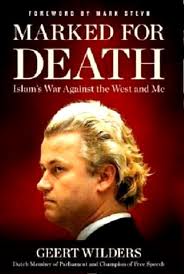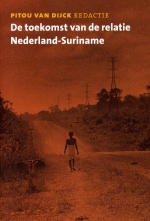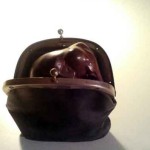The Dutch Party for Freedom. An Analysis of Geert Wilders’ Thinking on Islam
In The Dutch Party for Freedom. An Analysis of Geert Wilders’ Thinking on Islam (Previously published as The Speck In Your Brother’s Eye), Jan Jaap de Ruiter analyses Marked for Death. Islam’s War Against The West and Me writtten by Geert Wilders, leader of the Dutch Freedom Party.
‘The solution Wilders presents involves a high risk of invoking violence, even if he states repeatedly that his program should be realized by the word and the pen. Who will give me the assurance that this would indeed be the case? Who can guarantee us that there will not be people who, like so many Christians, Muslims and French revolutionaries, will take up the sword and ‘help’ to realize their goals that way? Wilders’ book brings us nothing new. Not only that, it is also completely counter- productive. Wilders’ message is not like that of religions and ideologies, which not only have a negative but also a positive side. It is exclusively negative. He focuses on the shortcomings of the other, accuses the other of being violent by nature, and uses words that can easily be interpreted as allowing violence to fight the enemy. He acts in exactly the same way as he perceives his opponent does. He sees the speck in his brother’s eye but fails to see the log in his own.
It may very well be the case that Geert Wilders will in due time give up his position as leader of the Freedom Party and leave the Dutch political arena. He might indeed, as was suggested, join an American think tank or travel the world spreading the message of the danger of Islam. Irrespective of where his career leads him, this will not mean that the anti Islam discourse will die out. On the contrary, it is supported by numerous others and in particular on the Internet it is very strong. Therefore countering this ideology by arguments, by pamphlets like this, remains necessary.
‘Am I showing myself to be a reprehensible cultural relativist here?’, asks De Ruiter in one of the chapters. ‘Undoubtedly’, is his answer.’
The Dutch Party for Freedom. An Analysis of Geert Wilders’ Thinking on Islam now online:
Chapter One – Wartime
Chapter Two – Truth
Chapter Three – Culture
Chapter Four – Ideology
Chapter Five – Solution
Chapter Six – The Speck In Your Brother’s Eye
IIDE Proceedings 2014 ~ Social Change in Our Technology-Based World ~ Contents & Preface and Acknowledgements
 Contents
Contents
Preface and Acknowledgements
Sytse Strijbos – Introduction: Social Change in our Technology-Based World
Michael Heyns – A Transcendental Inquiry into ‘Academic Capitalism in the New Economy’
Mark Rathbone – Corporate Social Responsibility, Deconstruction and Justice: A Response to Campbell Jones and Richard T De George
Attie van Niekerk – The Cultural Basis for a Sustainable Community in a South African Township
Lindile L. Ndabeni – The Informal Sector and Local Economic Developments in South Africa: An Evaluation of Some Critical Factors
Natallia Pashkevich, Darek M. Haftor – About IT Unemployment: Reflecting on Normative Aspects of the ‘Broken Link’
Darek M. Haftor, Erdelina Kurti – Toward Post Systems Thinking in the Conception of Whole-Part Relations
Fabian von Schéele, Darek M. Haftor – Cognitive Time Distortion as a Source of Risk in Economic Organizations: Conceptual Foundations
Anita Mirijamdotter, Mary Sommerville – Information -The ‘I’ in 21st Century Organizational IT Systems: An Informed Systems Methodology
Andrew Basden – A Dooyeweerdian Understanding of Affordance in Information Systems and Ecological Psychology
Maarten J. Verkerk – The Triple I model: A Translation of Dooyeweerdian Philosophical Concepts for Engineers
Darek M. Haftor – Dealing with Complexity: Some Critical Reflections upon Verkerk’s ‘Triple I Model’
Information about the International Institute for Development and Ethics
Information about the Annual Working Conferences
Preface and Acknowledgements
In 1995 an international and interdisciplinary research cooperation started, initially between researchers from some universities and institutions in Sweden and the Netherlands. In later years this initiative quickly expanded into a network of interested colleagues from the UK and South Africa. To summarize a long story in short: a stable core group with converging research interests was born that since then has operated fruitfully. The annual working conferences (AWC’s) have served as an international platform for researchers with a common interest for the use of Dooyeweerdian thinking in the interdisciplinary study for a broad range of issues regarding ‘technology and society’.
Looking back on the AWC 2014 we feel this international collaboration has again proven to be successful format. We take pride in hereby to present the final result of a wonderful conference with inspiring discussions and constructive input in each other’s research paper. All selected papers after the conference went through an intensive process of rewriting, based on the reports of the reviewers, and the instructions of the editors. While each chapter has been written as an independent piece of scholarly work, we hope that an introductory chapter authored by one of the editors is helpful for the reader to see the unity in diversity.
Finally, the editors wish to express their thanks to the authors, to each other for the collegial cooperation, and, last but not least, to Dr. Christine Boshuijzen – van Burken for her skilful management of the conference and the production process of these Proceedings.
The Editors
De werkvloer van het Koninkrijk. Over de samenwerking van Nederland met de Nederlandse Antillen en Aruba. Inhoudsopgave
In 1654 wordt door de vergadering van de Heren XIX, het bestuur van de West-Indische Compagnie, verzucht dat het behouden van Curaçao een te grote last betekent voor de Compagnie. De banden met Nederland blijven. Eeuwen later, in 1998, verschijnt een bundel opstellen Breekbare banden en in 2001 luidt de titel van een departementaal gedenkboek Knellende Koninkrijksbanden. In De werkvloer van het Koninkrijk wordt verslag gedaan van de samenwerking tussen Nederland en de ‘warme delen’ van het Koninkrijk in de periode dat min of meer vanzelfsprekend werd overeengekomen dat de Nederlandse Antillen en Aruba deel uit blijven maken van het Koninkrijk der Nederlanden. Het eerder dominerende dekolonisatie perspectief van aanstaande onafhankelijkheid is daarmee van de baan. De teneur van de samenwerking in Koninkrijksverband verandert en wordt meer en meer aangestuurd onder het adagium ‘blijvend, niet vrijblijvend’. De geldstroom uit Nederland naar de Nederlandse Antillen en Aruba valt als ontwikkelingshulp niet te legitimeren en heeft averechtse gevolgen. De formeel verankerde gelijkwaardigheid van de partners manifesteert zich in de praktijk van de verhoudingen steeds vaker in een spagaat van ongelijkheid waarvan Nederland de maat bepaalt. Toch is Nederland niet bij machte te voorkomen dat een ‘sociale kwestie’ op Curaçao onstaat die ‘overloopt’ naar ‘Antillen-gemeenten’ in Nederland. De moraal van het Koninkrijk is niet zo helder als voorheen. Wat zal het Koninkrijk voor de Caribische landen nog kunnen betekenen wanneer grenzen vervagen en Nederland steeds meer deel uitmaakt van Euroland?
Het boek De werkvloer van het Koninkrijk (Rozenberg Publishers, 2002) nu online:
De werkvloer van het Koninkrijk I: Inleiding
De werkvloer van het Koninkrijk II: Kernbegrippen
De werkvloer van het Koninkrijk III: Spagaat van ongelijkheid
De werkvloer van het Koninkrijk IV – Ontsporing van de samenwerking
De werkvloer van het Koninkrijk V – Formaat van de samenwerking
De werkvloer van het Koninkrijk VI – De vertegenwoordigheid van Nederland
De werkvloer van het Koninkrijk VII – Een doekje voor het bloeden
De werkvloer van het Koninkrijk VIII – De moraal van het koninkrijk
De werkvloer van het Koninkrijk IX – Edward Heerenveen – Epiloog
Plus: Video Antilliaans verhaal – Aflevering 1
Lammert de Jong (1942) studeerde aan de Vrije Universiteit in Amsterdam waar hij promoveerde. De titel van zijn proefschrift was Bestuur en publiek. Vanaf 1985-1998 was hij gedurende tal van jaren Read more
De toekomst van de relatie Nederland – Suriname
De serie De toekomst van de relatie Suriname – Nederland (in boekvorm verschenen in 2004) analyseert de bijzondere bilaterale hulprelatie sinds 1975, de successen en mislukkingen, en brengt een scala van inzichten bijeen over de toekomst van de relatie tussen beide landen. De serie onder redactie van Pitou van Dijck, econoom aan het Centrum voor Studie en Documentatie van Latijns Amerika (CEDLA) te Amsterdam, en gastdocent aan de Anton de Kom Universiteit in Paramaribo, bevat zeven bijdragen van auteurs uit Nederland, Suriname en de Verenigde Staten: Frits van Beek, Rob D. van den Berg, Pitou van Dijck, Dirk Kruijt, Hans R. Lim A Po en Gert Oostindie.
Pitou van Dijck – Ervaring en toekomstperspectief – een samenvatting
Gert Oostindie – De teloorgang van een bijzondere relatie
Pitou van Dijck – Hulp, beleid en economische groei
Dirk Kruijt – De hulprelatie sinds 1975
Rob D. van den Berg – De verdragsrelatie in een breder perspectief
Hans R. Lim a Po – Opgezegde verantwoordelijkheid en mislukte hoop
Frits van Beek – Een multilateraal en macro-economisch perspectief
Zie ook: Video Suriname – Deel Een 1973 – 1982
Déjà Vu ~ Herhaling in culturen wereldwijd
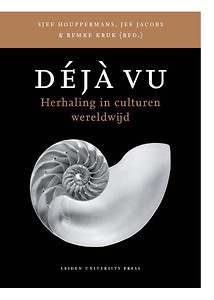 In 2011 verscheen bij Leiden University Press Déjà Vu ~ Herhaling in culturen wereldwijd onder redactie van Sjef Houppermans, Jef Jacobs & Remke Kruk (ISBN 9789087281465).
In 2011 verscheen bij Leiden University Press Déjà Vu ~ Herhaling in culturen wereldwijd onder redactie van Sjef Houppermans, Jef Jacobs & Remke Kruk (ISBN 9789087281465).
Herhaling speelt een centrale rol in menselijke cultuuruitingen. Slaapliedjes en smeekbeden, protesten en strijdkreten: van de wieg tot het graf begeleidt de herhaling de essentiële gebeurtenissen in het leven. Maar in een wereld die zelf voortdurend in beweging is, kan van zuivere herhaling geen sprake zijn. Je kunt onmogelijk tweemaal in dezelfde rivier stappen. Dat geldt ook in literatuur en kunst, waar herhaling veelvuldig wordt ingezet als artistiek middel. Daarbij is juist het verschil van essentiëel belang. Maar wat is precies de aard van dat verschil? Wat ‘doet’ herhaling als kunstgreep met het werk? En hoe kan herhaling worden ingezet om gevestigde belangen en opvattingen te consolideren of juist te ondermijnen?
Déjà Vu behandelt deze vragen vanuit een interdisciplinair en mondiaal perspectief en laat daarbij zien hoe het middel van de herhaling door alle tijden en alle culturen wordt toegepast in beeldende kunst, muziek, literatuur en film.
Madeleine Kasten – Voorwoord
Sjef Houppermans – Introductie
Edwin Wieringa – Trouw niet met Bataviase juffertjes! Bataviase juffertjes zitten vol kuren. Herhaling als wezenskenmerk van de pantoen en pantoum
Paul J. Smith – Ennui en herhaling bij Baudelaire
Madeleine Kasten – Vertaalslag in niemands land: Tom Lanoye en de poëzie uit de Groote Oorlog
Theo J. H. Krispijn – Herhaling, parafrase en bewerking in het Gilgameš-epos
Jef Jacobs – Verhalen van de speelman. Herhaling in de literatuur van de twaalfde eeuw
Remke Kruk – De bruiloften van Maryam Dollekop. Het gebruik van herhaling in de Arabische volksepiek
Marjan Groot – Herhaling in verhalen over ornament
Helen Westgeest – Herhalingsstrategieën in het fotografische werk van Idris Khan
Peter Verstraten – ‘Play it again…’: De waarde van film remakes
Anne van Oostrum – Moultaka’s muwashshaha: ontsnapping uit de cyclus van de Arabische muziek
Petra de Bruijn – Herhalingsrecepten: Noach’s pudding in De bastaard van Istanbul
Bart Veldhoen – Een academische romance: David Lodge, Small World
Wim Tigges – Mister Pip: Een navertelling zonder opsmuk
Sjef Houppermans – Herneming der herhalingen: Van Kierkegaard tot Robbe-Grillet
Wim Peeters – Abrahams offer. Of de dwangmatige herhaling van een vader-mythe
Over de auteurs
Effective PhD Supervision – Mentorship and Coaching
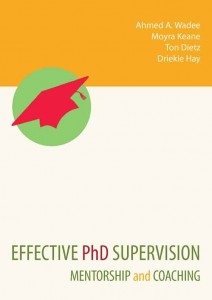 The complete book online
The complete book online
Chapter One: Chapter One: Introduction
Chapter Two: Guidelines for Supervisors
Chapter Three: Guidelines for Mentors
Chapter Four: Coaching: Charting your own Path
Chapter Five: The Relationship between PhD Candidate and Supervisor
Chapter Six: A Holistic Approach to PhD Support
Chapter Seven: Bibliography and Recommended Reading
Appendices and Acknowledgments
